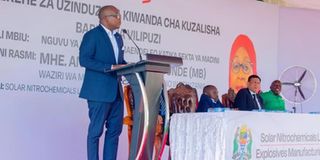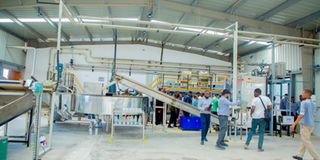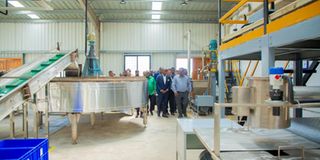Prime
Tanzania set to stop importing explosives as local factory commences production

The Minister for Minerals, Mr Anthony Mavunde, speaks after inaugurating the Solar Nitrochemicals Limited factory in Kisarawe, Coast Region, on April 13, 2025. PHOTO | COURTESY
What you need to know:
- Each year, the country imports an estimated 10 million detonators and 26,000 tonnes of explosives to support its growing mining sector.
Kisarawe. Tanzania is on track to end the importation of explosives and detonators following the commissioning of a major local manufacturing plant in Kisarawe District, Coast Region.
Each year, the country imports an estimated 10 million detonators and 26,000 tonnes of explosives to support its growing mining sector.
However, this dependency is set to decrease significantly after the launch of the Solar Nitrochemicals Limited factory.
Inaugurated on Sunday, April 13, 2025, by the Minister for Minerals, Mr Anthony Mavunde, the factory is expected to produce 22,000 tonnes of explosives and 15 million detonators annually—sufficient to meet and surpass domestic demand.
“We are steadily moving towards stopping the importation of detonators and explosives,” Mr Mavunde said during the launch ceremony held at Visegese in Kisarawe.

He said the Sh19 billion facility is the first in the country to produce explosives and detonators at such a scale, and is poised to make a significant impact on national revenue generation through the mining sector.
“In the 2022/23 financial year, the mining sector contributed 7.2 percent to GDP. In 2024, it rose to 9.0 percent. This year, we are targeting a 10 percent contribution,” he said.
Mr Mavunde noted that the mining sector relies heavily on consistent and affordable access to explosives and detonators, adding that local production would ease supply constraints and reduce import costs.
“Production at this factory will cover 95 percent of the country’s demand,” he stated.
In addition to meeting local needs, Tanzania is also eyeing the export market. Mr Mavunde said the surplus production would enable the country to export explosives and detonators, thereby earning foreign exchange, generating employment, and accelerating industrialisation.

Solar Nitrochemicals Limited Group Executive Director, Mr Milind Deshmukh, said the factory has so far created 300 direct jobs. He added that more employment opportunities are expected as operations expand.
“We are optimistic that this investment will bring long-term benefits to Tanzania’s economy,” he said.
Kisarawe District Commissioner, Mr Tito Magoti, welcomed the investment but pointed out infrastructural challenges in the area, particularly poor roads and inadequate water supply.
He appealed to Mr Mavunde to relay the concerns to the Minister for Water, Mr Juma Aweso, and the Minister for Works, Mr Abdallah Ulega.
In response, Mr Mavunde said the concerns would be channelled through the area Member of Parliament, Mr Suleiman Jaffo, to the relevant ministries for appropriate action.



